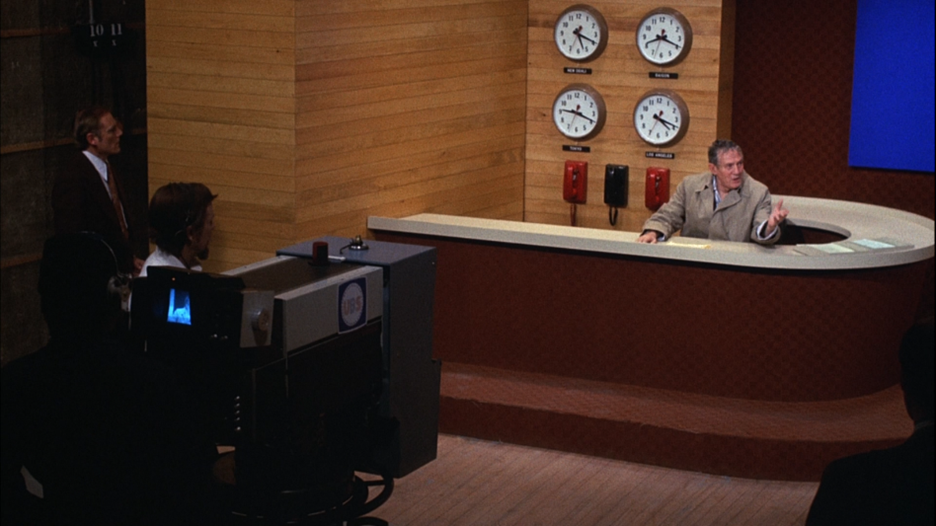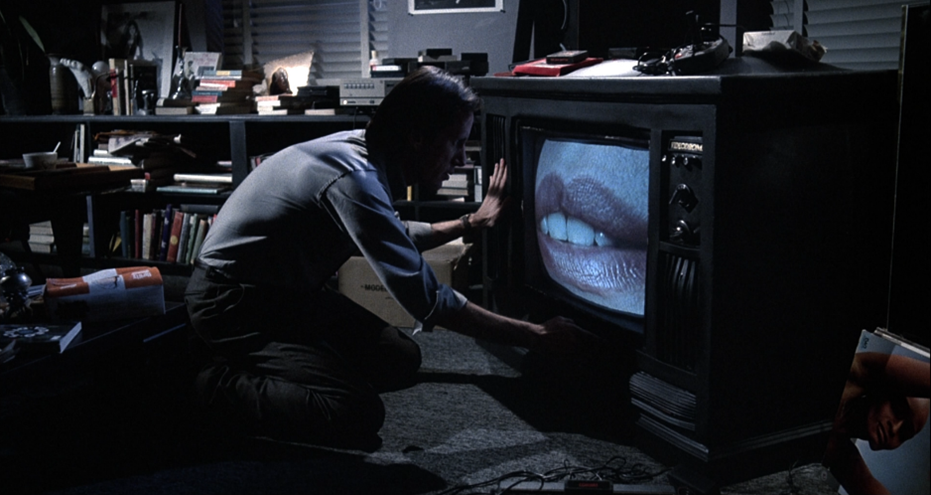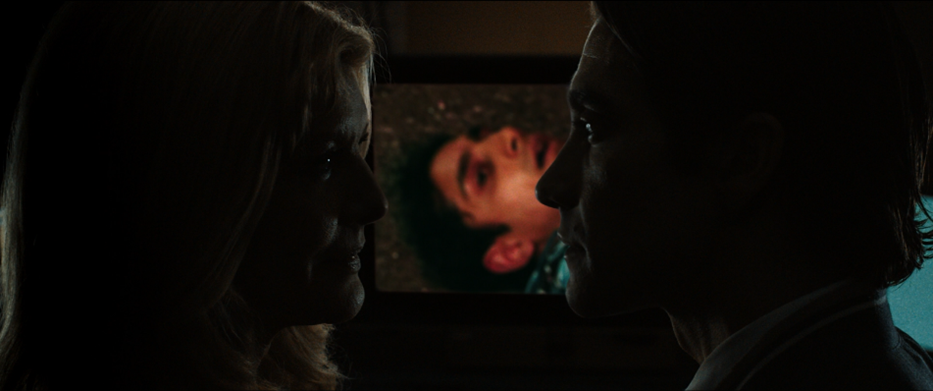The daily inundation of global events through outlets like news programs, the internet, and word of mouth is truly staggering. The myriad of news stories easily available brings with it increased accessibility to knowledge of disturbing events. This begs the question of what negative effects such a large amount of controversial content can have on someone. To explore this notion of an ever-decreasing humanity stemming from the media one consumes, I have assembled a festival of satirical, outlandish, and cynical portrayals of people taking too deep of an interest in the most sensational media. These three stylistically unique, yet thematically unified films are Network (Lumet, 1976), Videodrome (Cronenberg, 1983) and Nightcrawler (Gilroy, 2014). While these films are different in tone and execution, they nevertheless present characters that become desensitized by media that pushes ethical and moral boundaries.
The film to open this festival is Sidney Lumet’s 1976 satirical comedy, Network. The viewer is transported to struggling news station UBS in New York City. There, head anchor Howard Beale (Peter Finch) is suffering a mental breakdown due to his inability to accept the current state of the world. One night, on the air, Beale announces his plans to kill himself during a live telecast a week later. Howard’s friend Max (William Holden) believes that Beale needs psychiatric help, however, Diana Christensen (Faye Dunaway), the head of the programming department, has a different plan for Beale. Because his actions brought attention to UBS, she intends to develop a show dedicated entirely to Beale’s tirades as she believes he has struck a chord with an audience that holds similar feelings toward the world. Diana seeks to exploit Howard for her own gain. In her essay, “Network: The Other Cold War,” author Kathleen Fitzpatrick describes Diana as the embodiment of the film’s criticisms against sensational television, as she “is everything we are led to despise about the medium: crass, cold, calculating, and terrifyingly business-driven” (37). This negative portrayal of Diana stems from the film’s notion that new sensationalist media is costing society its humanity. Diana and the higher-ups at UBS see Howard not as a person, but as a vehicle to further their own careers. They are only concerned for Beale once he costs the network revenue. When Beale rants against a recent deal made between UBS’s parent company and an overseas conglomerate during a taping, for instance, he is soon reprimanded for his statements. His series then takes an unappealing solemn tone that loses UBS viewership. Unable to fire Beale, Diana and the higher-ups opt to have him assassinated live on air to both end his show and serve as a backdoor pilot for a series focused on the assassins that Diana has developed. Ultimately, the plan is put into action and Beale is murdered for his “lousy ratings.” Despite the exaggeration of its portrayal, the film presents a lack of humanity from its characters regarding Beale’s mental state. As long as Diana and UBS can monetize Beale, they intend to keep his declining mental state on air. The prospects of whatever newsworthy content he could bring to the network overshadow any feelings of decency they have for Beale.
The second feature of this festival is David Cronenberg’s 1983 film, Videodrome. It tells the bizarre story of Max Renn (James Woods), the CEO of a sleazy UHF station in Toronto, Canada, called CIVIC-TV. Max specializes in the most deranged and extreme material for his channel. When his employee, Harlan (Peter Dvorsky) discovers a pirate broadcast of realistic murder and torture footage called Videodrome, Max enthusiastically orders Harlan to show the program on CIVIC-TV. What follows is a surreal and otherworldly film in which Max tries to discover the source behind the broadcast and loses his sense of reality, as he begins to suffer from hallucinations that blur the line between reality and fiction. Eventually, Max learns that the people running Videodrome have weaponized the program to embed tumors in its viewers to purify the population, as they deem anyone watching the broadcast as degenerate. In turn, Max’s hallucinations are the result of tumors forming from his obsessive viewing of the show. The effects of sensational media are discussed, early in the film, when Max is interviewed as to whether his channel could lead to a violent societal climate. Max responds that CIVIC-TV is an outlet for his viewers’ fantasies and frustrations, which he sees as a service that other networks simply cannot offer. To Max, the disturbing content he broadcasts on his channel is merely a way to supply demand. Max’s fascination with the disturbing nature of Videodrome begins as an interest in potentially increasing viewership to CIVIC-TV and develops into an obsession that changes him mentally and physically. Writing for Criterion, Gary Indiana compares Max’s obsession with Videodrome to the average American’s television intake, stating that someone’s exposure to media can have a permanent impact on their mindset. This idea of content affecting someone negatively is evident through the depiction of the effects of the broadcast on Max. The tumors caused by Videodrome result in his body grotesquely morphing, and his psyche shattering entirely, as he perceives his television as breathing and speaking to him. By the end of the film, Max ceases to be fully recognizable as a human, as his hand disgustingly merges with a gun and he goes on a rampage against his partners at CIVIC-TV and the men behind Videodrome. While surreal, the film nevertheless presents the theme of an intense obsession with sensational media causing someone to lose their humanity through Max’s physical and mental deterioration.
The final film of this festival is Dan Gilroy’s 2014 thriller, Nightcrawler. It tells the story of con man Louis Bloom (Jake Gyllenhaal), who becomes a freelance cameraman for an LA news station. Louis’s intense recordings capture the attention of morning news director Nina Romina (Rene Russo), who always wants more shocking footage to increase viewership to the station. As Louis begins to make steady earnings, he hires a young man named Rick (Riz Ahmed) to be his partner. Louis crosses the line and starts to alter crime scenes to create more cinematic compositions in his footage, such as rearranging a body at a car crash and sneaking into homes to obtain dramatic shots of victims. The world of Nightcrawler is obsessed with headlines, demonstrated by transitionary shots of television antennae accompanied by an overwhelming barrage of indiscernible audible news reports. A phrase repeated by characters regarding news stories is “If it bleeds, it leads,” and this notion guides Louis’s actions throughout the film. Louis does not value the lives of others, and he will not hesitate to put people in danger if he believes it will increase the value of his footage. For example, Louis deletes video that could lead to the arrests of two wanted criminals in the hopes that their capture will be delayed enough for him to film them committing more crimes. This leads to a climactic chase and shootout that results in numerous deaths, including Rick, whose final moments are captured by Louis. Louis notably lacks an arc, as he sinks from bad to worse; instead, the lengths to which Louis will go for dramatic and profitable content become the focus. Regarding Louis’s characterization, Dan Gilroy explained: “[T]he messages and ideas in the film became more prominent. [Louis] is plowing through boundaries and keeps going” (Gilroy). Louis is only influenced by the outrageous videos he hopes to profit from, leading characters like Rick to act as reactionary conduits for the audience. Nina also demonstrates a lack of sympathy, generally viewing tragic events in LA such as a plane crash and a home invasion as potential for earnings. She refers to the recording of Rick’s death as “amazing” and thanks Louis for his work; all the while, Rick’s final moments are on a background monitor in the center of the frame, drawing the viewer’s attention just as much as Nina and Louis. There is no humanity to Louis, and while he was never a good person, it can be reasoned that, by the film’s conclusion, he has become even worse due to his drive to capture sensational news stories for his own gain, even if it means putting others in danger.
While differing in tone and style, all three films display the common element of someone lacking morality resulting from their greed and obsession with the most controversial media. Diana, Max, and Louis all portray a common thematic thread of losing one’s humanity and decency via the content they ingest. The inhumane nature of these characters takes shape through the exploitation of someone’s declining health, ceasing to be an actual human resulting from the content they consume, and actively putting others in danger for personal success. Regardless of their unique tones, be it satirical, surreal, or cynical, all three films showcase the harmful effects that can arise when one entirely dedicates themselves to twisted, harmful, and sensational content.
Author Biography
Peyton Holland is an undergraduate in the film studies major at the University of North Carolina Wilmington. He intends to pursue a graduate degree in film studies at UNCW, as well. After college, he hopes to become a screenwriter or author. In addition to his passion for movies, Peyton also enjoys vacationing to visit filming locations from his favorite films across the United States.
References
Cronenberg, David, director. Videodrome. Universal, 1983.
Fitzpatrick, Kathleen. “Network: The Other Cold War.” Film & History: An Interdisciplinary Journal of Film and Television Studies, vol. 31 no. 2, 2001, p. 37. Project MUSE, https://muse.jhu.edu/article/400699. Accessed 21 Apr. 2021.
Gilroy, Dan, director. Nightcrawler. Universal, 2014.
Gilroy, Dan. “Interview: ‘Nightcrawler’ Director Dan Gilroy on Manipulation and Ditching the Character Arc.” Interview by Russ Fischer. Slashfilm, 31 Oct. 2014, https://www.slashfilm.com/dan-gilroy-interview/. Accessed 21 Apr. 2021.
Indiana, Gary. “Videodrome: The Slithery Sense of Unreality.” The Criterion Collection, 7 Dec. 2010, https://www.criterion.com/current/posts/1678-videodrome-the-slithery-sense-of- unreality. Accessed 21 Apr. 2021. Lumet, Sidney, director. Network. Metro-Goldwyn Meyer, 1976.










































